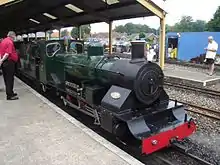Aylsham railway station
Aylsham railway station is located in the town of Aylsham in Norfolk and is the northern terminus of the Bure Valley Railway, a narrow gauge operation which reuses some of the trackbed of a former standard gauge branch line, closed in 1977. The station occupies the same site as the former Aylsham South railway station, which operated here between 1880 and 1952.
Aylsham | |
|---|---|
| Station on heritage railway | |
 Main entrance to Aylsham railway station. | |
| Location | Aylsham, Broadland, Norfolk England |
| Coordinates | 52.79050°N 1.25393°E |
| Grid reference | TR153347 |
| Managed by | BVR |
| Platforms | 3 open (originally 4) |
| Key dates | |
| 10 July 1990 | Opened |
History
Aylsham South railway station, the first on this site, opened in 1880.[1] It was operated by the East Norfolk Railway, then the Great Eastern Railway, and became part of the London and North Eastern Railway during the Grouping of 1923. The station passed into the Eastern Region of British Railways on nationalisation in 1948. In 1952 the passenger service stopped, and the freight service was discontinued in 1977. The fine period station buildings stood after closure until 1990, when the Bure Valley Railway opened. Taking over the site, the original buildings were deemed unsuitable for the new project, and were demolished.[2] The new Aylsham railway station was constructed on the site, and opened on 10 July 1990.
Facilities

The station has three platforms. Platform 3 sees only occasional passenger use, but is used for stock storage. Platforms 1 and 2 are in regular use. Both are linked to a central locomotive release road. These two platforms and the central release road are all supplied with terminal headshunts, all of which are linked via a complex tri-directional set of points. Platforms 1 and 2, and the release road, are all protected by an overall station roof. (These platforms were originally numbered 2, 3, and 4, but were re-numbered as 1, 2, and 3 as the original platform 1 had been subsumed into the new Aylsham locomotive depot.)
The modern station buildings contain a cafeteria, booking office, staff room, shop, administrative offices, toilets, and entrance foyer. Additionally, a substantial wooden building has been set up on platform 3 by the supporters association, the Friends of the Bure Valley Railway. There is a large car park.
Alongside the station is the railway's Aylsham Locomotive Depot, a large three-track engine shed, capable of housing all the railway's locomotives. Behind the locomotive depot is the railway's main engineering workshop, equipped to carry out running repairs or full-scale locomotive overhauls. This facility also contains locker rooms, wash rooms, and administrative offices for the railway's engineers.
The operating facilities of the station also include a turntable, several sidings (used primarily for engineering vehicles), facilities for fueling and watering locomotives, and a signal box containing the main line control centre, from which computerised control and radio communication are used to operate the block section system of train control.
| Preceding station | Following station | |||
|---|---|---|---|---|
| Terminus | Bure Valley Railway | Brampton | ||
References
- Branch opening recorded here.
- Norfolk By Rail.
- Butt, R. V. J. (1995). The Directory of Railway Stations: details every public and private passenger station, halt, platform and stopping place, past and present (1st ed.). Sparkford: Patrick Stephens Ltd. ISBN 978-1-85260-508-7. OCLC 60251199.
- Jowett, Alan (2000). Jowett's Nationalised Railway Atlas (1st ed.). Penryn, Cornwall: Atlantic Transport Publishers. ISBN 978-0-906899-99-1. OCLC 228266687.
- Jowett, Alan (March 1989). Jowett's Railway Atlas of Great Britain and Ireland: From Pre-Grouping to the Present Day (1st ed.). Sparkford: Patrick Stephens Ltd. ISBN 978-1-85260-086-0. OCLC 22311137.